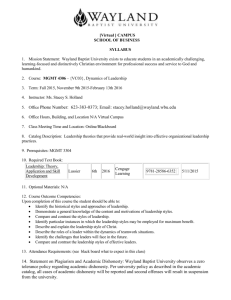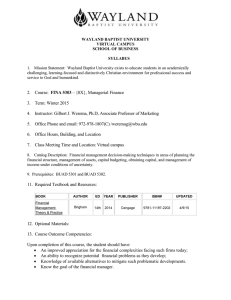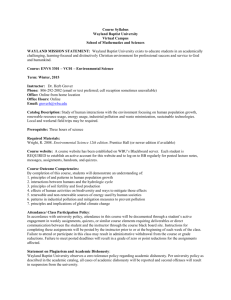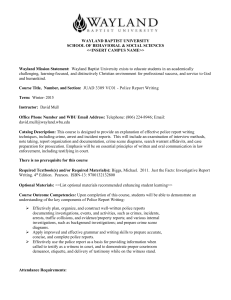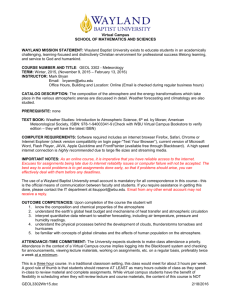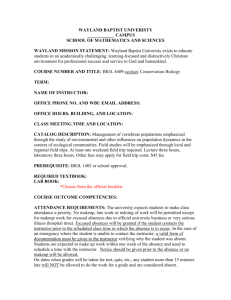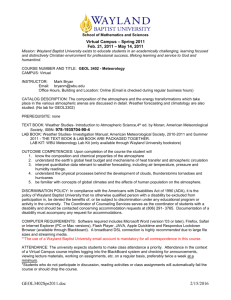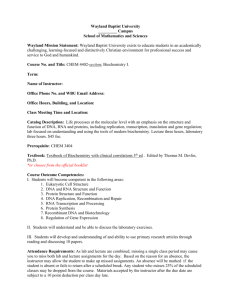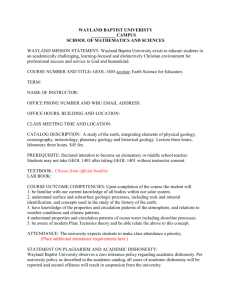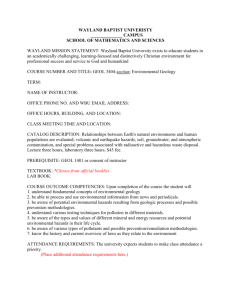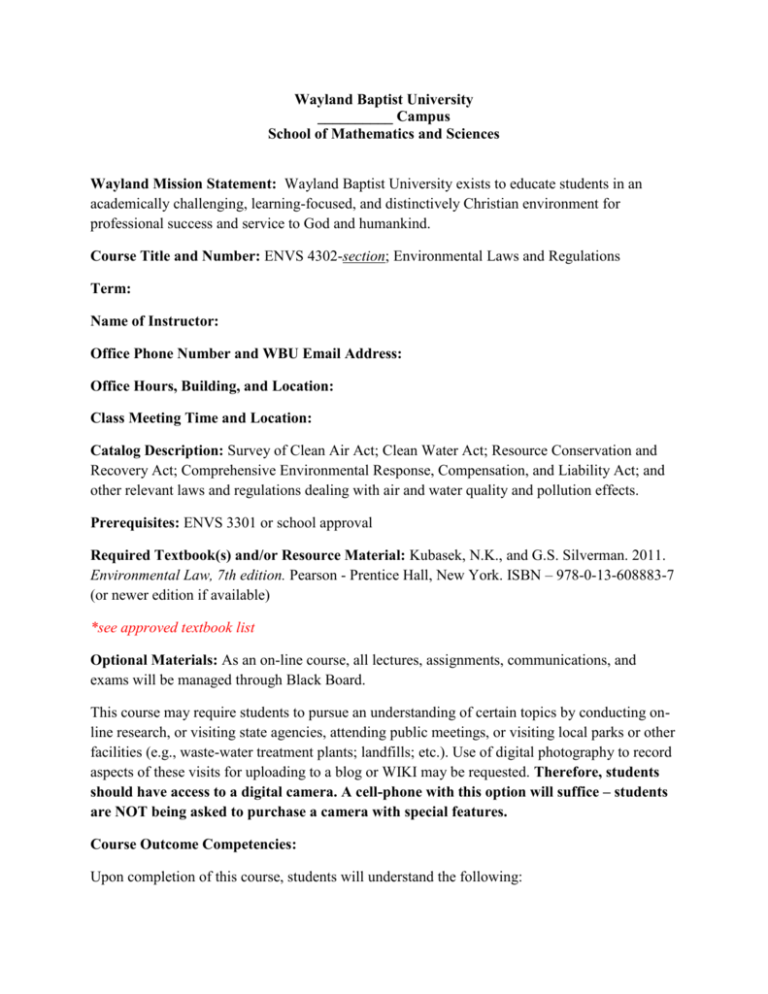
Wayland Baptist University
__________ Campus
School of Mathematics and Sciences
Wayland Mission Statement: Wayland Baptist University exists to educate students in an
academically challenging, learning-focused, and distinctively Christian environment for
professional success and service to God and humankind.
Course Title and Number: ENVS 4302-section; Environmental Laws and Regulations
Term:
Name of Instructor:
Office Phone Number and WBU Email Address:
Office Hours, Building, and Location:
Class Meeting Time and Location:
Catalog Description: Survey of Clean Air Act; Clean Water Act; Resource Conservation and
Recovery Act; Comprehensive Environmental Response, Compensation, and Liability Act; and
other relevant laws and regulations dealing with air and water quality and pollution effects.
Prerequisites: ENVS 3301 or school approval
Required Textbook(s) and/or Resource Material: Kubasek, N.K., and G.S. Silverman. 2011.
Environmental Law, 7th edition. Pearson - Prentice Hall, New York. ISBN – 978-0-13-608883-7
(or newer edition if available)
*see approved textbook list
Optional Materials: As an on-line course, all lectures, assignments, communications, and
exams will be managed through Black Board.
This course may require students to pursue an understanding of certain topics by conducting online research, or visiting state agencies, attending public meetings, or visiting local parks or other
facilities (e.g., waste-water treatment plants; landfills; etc.). Use of digital photography to record
aspects of these visits for uploading to a blog or WIKI may be requested. Therefore, students
should have access to a digital camera. A cell-phone with this option will suffice – students
are NOT being asked to purchase a camera with special features.
Course Outcome Competencies:
Upon completion of this course, students will understand the following:
1. How public policy affects environmental regulations
2. How environmental regulations are formulated, structured, and implemented
3. How air and water quality are regulated
4. How wastes are regulated
5. How polluted sites are cleaned up
Attendance Requirements:
In accordance with university policy, attendance in this course will be documented through a
student’s active engagement in weekly assignments, quizzes, or similar course elements
requiring deliverables or direct communication between the student and the instructor through
the course black board site. Instructions for completing these assignments will be posted by the
instructor prior to or at the beginning of each week of the class. Failure to attend or participate in
this class may result in administrative withdrawal from the course or grade reductions. Failure to
meet posted deadlines will result in a grade of zero or point reductions for the assignments
affected.
Statement on Plagiarism and Academic Dishonesty:
Wayland Baptist University observes a zero tolerance policy regarding academic dishonesty. Per
university policy as described in the academic catalog, all cases of academic dishonesty will be
reported and second offenses will result in suspension from the university.
Disability Statement:
In compliance with the Americans with Disabilities Act of 1990 (ADA), it is the policy
ofWayland Baptist University that no otherwise qualified person with a disability be excluded
from participation in, be denied the benefits of, or be subject to discrimination under any
educational program or activity in the university. The Coordinator of Counseling Services
serves as the coordinator of students with a disability and should be contacted concerning
accommodation requests at (806) 291-3765. Documentation of a disability must accompany any
request for accommodations.
Course Requirements and Grading Criteria:
Students will be evaluated by on-line quizzes and exams; group or individually assigned
projects; written reports and/or presentations using various media tools (e.g. digital photography
or video); and class participation. Certain course content may be conveyed as video and/or audio
files posted on the internet or in Black Board. Students are expected to access the course Black
Board site regularly; have an internet connection with sufficient capacity to download and
upload posted materials and submit assignment deliverables; and be proficient in the use of
computer software and internet tools required for effective participation in and completion of an
on-line course. Some technical assistance is available through Wayland’s Virtual Campus
helpdesk, but students are ultimately responsible for ensuring that their internet connection and
technical competencies are sufficient to effectively engage in, and successfully complete this
course.
Grading:
Examinations over lecture material will be weighted to account for 60% of the student’s final
grade; individual projects, written papers and assignments for 30%; and class participation for
10%. Quizzes, lecture exams, and proctored midterm and final exams will constitute the
examination requirement. The individual project, written papers and assignments requirement
will include a project in which the student will monitor some aspect of environmental law or
regulation development; produce a major research paper; and respond to short research and
writing assignments as appropriate. Class participation will be assessed through participation in
blogs, journals, or other writing assignments as appropriate.
Students shall have protection through orderly procedures against prejudices or capricious
academic evaluation. A student who believes that he or she has not been held to realistic
academic standards, just evaluation procedures, or appropriate grading, may appeal the final
grade given in the course by using the student grade appeal process described in the Academic
Catalog. Appeals may not be made for advanced placement examinations or course
bypass examinations. Appeals are limited to the final course grade, which may be upheld, raised,
or lowered at any stage of the appeal process. Any recommendation to lower a course grade must
be submitted through the Executive Vice President/Provost to the Faculty Assembly Grade
Appeals Committee for review and approval. The Faculty Assembly Grade Appeals Committee
may instruct that the course grade be upheld, raised, or lowered to a more proper evaluation.
Tentative Schedule:
The following class schedule is subject to modification by the instructor. The order in which
material is presented or actual exam dates may change. Topic or schedule changes will be posted
on Black Board.
Additional Information and/or Special Notes:
Revised 03/18/15

